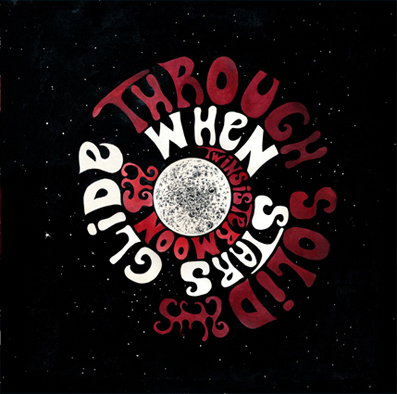
This is the long-awaited reissue of Mehdi Ameziane's incredibly scarce 2007 solo debut, which was previously only available as a self-released CDr edition of just 30.  Naturally, both Twinsistermoon and Natural Snow Buildings have evolved and blurred together quite a bit over the last four years, but at the time of its original release, these raw, fragile, and eerie pieces were a dramatic departure from the less distinctive drone/post-rock that Mehdi and Solange Gularte had been releasing.  While I definitely believe that Mehdi's work has only become stronger over the ensuing years, this remains a unique and mesmerizing highlight in his voluminous discography.
I have no idea what triggered it, but the years 2006 and 2007 were an incredibly fertile creative period for Natural Snow Buildings.  For one, they released a brilliant double album that many still consider to be their greatest work, The Dance of The Moon and The Sun.  Then, both Mehdi and Solange released stunning and wildly different solo albums (Solange's being Isengrind's Golestan).  There were always unusual threads running through NSB's sound, but up until that point, it was very easy to see close similarities to other artists like Tarentel, Godspeed You Black Emperor!, Stars of the Lid, and Windy and Carl. Both the hallucinatory pagan drone of Golestan and the haunting childlike folk of When Stars Glide Though Solid had no such clear reference points or precedents though: from 2007 onward, no one else sounded like Natural Snow Buildings.  Even since then, the "Natural Snow Buildings aesthetic" has seemed to be largely based upon perfecting and blending those two disparate threads (and they have been doing it extremely successfully).  It was a career-defining period.
The simplest way to describe Mehdi's sound for much of When Stars Glide Through Solid is "field recordings of a choir of undead children singing around a campfire," a rather singular vision best expressed in pieces like "Ojibway Ghost Trail Song" and "Momuzo."  Ameziane covers a lot of other stylistic territory as well, but tape hiss, sparse acoustic guitar accompaniment, soft childlike/feminine vocals, and an otherwordly sense of temporal dislocation are fairly omnipresent throughout.  While a number of the vocal pieces are quite strong ("To Breathe Underwater," in particular), my favorite moments tend to be the more abstract ones.  The opening "I Wish I Could Drown The World In Reverberation," for example, beautifully interweaves shimmering layers of shoe-gazing guitar, spectral wordless vocals, and quasi-tribal percussion into something that easily could been a highlight on The Dance of The Moon And The Sun.  The brilliant title piece also recalls Ameziane's work with Gularte, but goes even further: it seems far more in line with future masterpieces like Waves of the Random Sea...or something like a boisterous funeral parade for an imagined culture from several hundred years in the past.
I suspect that this album would have completely floored me if I had heard it when it was originally released, as I am quite used to Mehdi's strain of ghostly folk at this stage.  I miss having fresh ears.  Also, I can't help but compare everything he releases to the amazing ...And Then Feel The Ashes.  Despite that daunting mixture of familiarity and unfairly high expectation, however, I still managed to find quite a lot to love here.  This isn't the best Twinsistermoon album to start with, due to its somewhat primitive recording quality, but the content is absolutely essential for those already converted (particularly those who prefer Mehdi's more song-like side).
(Note: The vinyl version of this reissue includes one full side of bonus material, much of which is as good as the actual album.  Also, Solange's new artwork for the inner gatefold is among her best.)
Samples:
 
 
 
Read More

